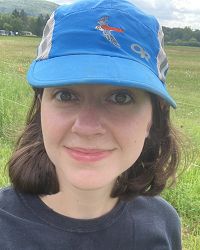Congratulations to the three Soil & Crop Science graduate students who have received research awards from Cornell’s Atkinson Center for Sustainability. Sophie Westbrook received an award from the Sustainable Biodiversity Fund. Aneesh Chandel and Maria Rivera are recipients of Graduate Research Grants.
Restoring Biodiversity and Ecosystem Services to Agricultural Landscapes: Are Annual Flower Strips the Answer?
Sophie Westbrook (Soil & Crop Sciences)
Advisor: Antonio DiTommaso
 Flower strips increase agroecosystem biodiversity at multiple trophic levels. This practice does not require major agroecosystem redesign or yield losses, so theoretically it is available to many growers. However, despite established literature on flower strips and subsidies available in the United States and Europe, this practice is not widely adopted. Westbrook’s research seeks to identify flower strip systems that are both effective and more accessible than standard systems. The work will focus on preserving growers’ management flexibility by requiring only a single year’s commitment and avoiding in-season field operations. It also will explore how delayed planting and landscape context modify the effects of flower strips. These findings will enable Northeastern growers to make accurate, site-specific predictions about the costs and benefits of flower strips.
Flower strips increase agroecosystem biodiversity at multiple trophic levels. This practice does not require major agroecosystem redesign or yield losses, so theoretically it is available to many growers. However, despite established literature on flower strips and subsidies available in the United States and Europe, this practice is not widely adopted. Westbrook’s research seeks to identify flower strip systems that are both effective and more accessible than standard systems. The work will focus on preserving growers’ management flexibility by requiring only a single year’s commitment and avoiding in-season field operations. It also will explore how delayed planting and landscape context modify the effects of flower strips. These findings will enable Northeastern growers to make accurate, site-specific predictions about the costs and benefits of flower strips.
Empirical Measurements and Improved Model Representation of Hydraulic Redistribution as a Control on Function of Semiarid Woody Ecosystems (RCR)
Aneesh Chandel (Soil & Crop Sciences)
Advisor: Yiqi Luo
 Chandel is a soil and crop sciences Ph.D. student in the Luo lab at Cornell University whose research focuses on improving the model representation of plant-mediated water distribution between soil layers as a control on the functions of dryland ecosystems. Drylands cover more than 40% of the land surface and play a dominant role in global carbon sequestration. The current Earth system models are unable to simulate dryland ecosystem function, partly due to a poor representation of plant-available water dynamics. Chandel aims to utilize long-term observational data collected in AmeriFlux core sites in dominant dryland woody biomes in the Southwestern U.S. and employ the data assimilation approach to develop a robust dryland ecosystem model.
Chandel is a soil and crop sciences Ph.D. student in the Luo lab at Cornell University whose research focuses on improving the model representation of plant-mediated water distribution between soil layers as a control on the functions of dryland ecosystems. Drylands cover more than 40% of the land surface and play a dominant role in global carbon sequestration. The current Earth system models are unable to simulate dryland ecosystem function, partly due to a poor representation of plant-available water dynamics. Chandel aims to utilize long-term observational data collected in AmeriFlux core sites in dominant dryland woody biomes in the Southwestern U.S. and employ the data assimilation approach to develop a robust dryland ecosystem model.
Enhanced Rock Weathering and the Persistence of Soil Organic Carbon (RCR)
Maria Rivera (Soil & Crop Sciences)
Advisor: Johannes Lehmann
 Enhanced rock weathering (ERW) is a carbon dioxide removal strategy that amends soils with crushed magnesium and calcium silicate rock to accelerate carbon capture in soils. The effect of ERW on soil organic matter has received little attention, but past literature in organo-mineral associations suggests potential for organic carbon accrual. Through experiments, Rivera will learn the basic mechanisms by which magnesium and calcium silicate minerals extracted from ERW influence soil organic matter persistence. The findings will contribute to a holistic understanding of ERW as a carbon dioxide removal strategy, improve model predictions for ERW, and contribute to IPCC’s knowledge for enhanced weathering, a strategy now necessary for mitigating anthropogenic climate change.
Enhanced rock weathering (ERW) is a carbon dioxide removal strategy that amends soils with crushed magnesium and calcium silicate rock to accelerate carbon capture in soils. The effect of ERW on soil organic matter has received little attention, but past literature in organo-mineral associations suggests potential for organic carbon accrual. Through experiments, Rivera will learn the basic mechanisms by which magnesium and calcium silicate minerals extracted from ERW influence soil organic matter persistence. The findings will contribute to a holistic understanding of ERW as a carbon dioxide removal strategy, improve model predictions for ERW, and contribute to IPCC’s knowledge for enhanced weathering, a strategy now necessary for mitigating anthropogenic climate change.
Complete list of 2023 awardees for the Graduate Research Grants
Complete list of 2023 awardees for Sustainable Biodiversity Fund
